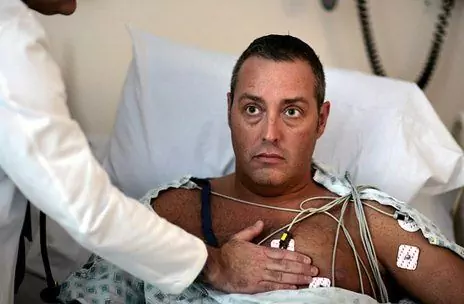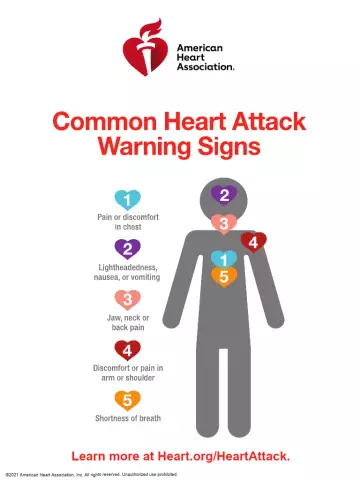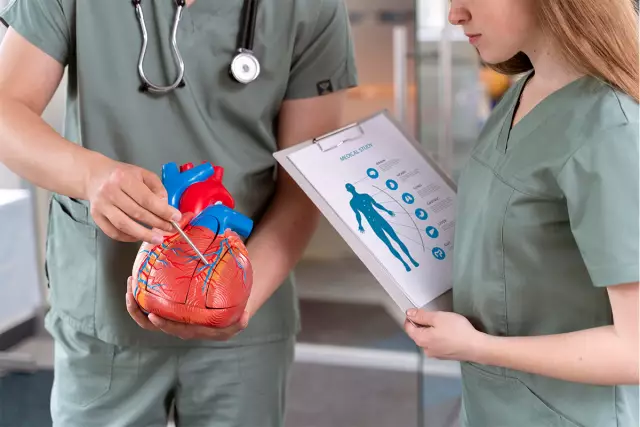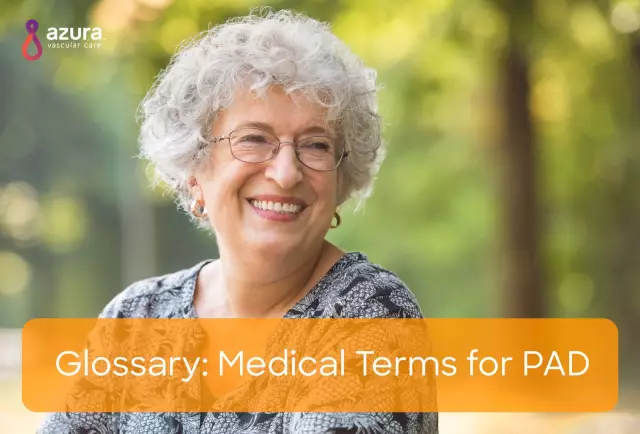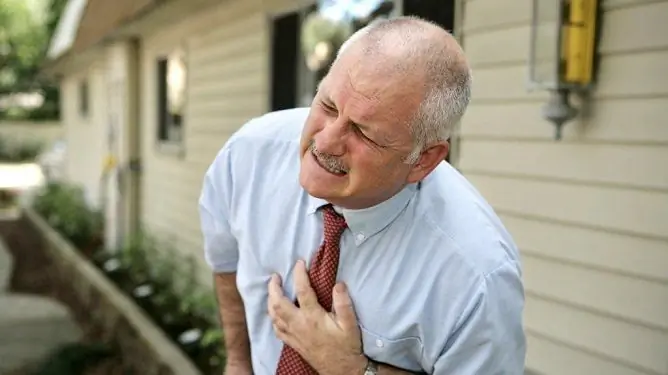- Author Rachel Wainwright wainwright@abchealthonline.com.
- Public 2023-12-15 07:39.
- Last modified 2025-11-02 20:14.
Heart block
The content of the article:
- Causes and risk factors
- Forms of the disease
- Symptoms
- Diagnostics
- Treatment
- Possible complications and consequences
- Forecast
Heart block is a violation of the conduction of nerve impulses through the conducting system of the heart.

A heart block is understood as a violation of the conduction of nerve impulses
The conducting system of the heart is represented by a combination of several structures:
- sinoauricular, or sinus, node (pacemaker), in which nerve impulses are generated that determine the heart rate;
- atrioventricular node, which transmits impulses from the pacemaker located in the right atrium to the underlying structures;
- a bundle of His, along the legs of which nerve impulses propagate in the tissues of the right and left ventricles through the smallest structures that are in direct contact with the contractile myocardium - Purkinje fibers.
The functioning of the cardiac conduction system depends on several factors:
- the activity of the sympathetic and parasympathetic links of the peripheral nervous system (the parasympathetic mediator acetylcholine slows down the rate of impulse conduction, and sympathetic norepinephrine accelerates);
- the degree of myocardial blood filling (with ischemia, a shift in acid-base balance develops, leading to a slowdown in conduction);
- hormonal background;
- hypo- or hyperkalemia (accelerates or slows down the speed of the impulse, respectively).
When pathological conditions appear or changes in factors affecting the intensity of the work of the cardiac conduction system, all kinds of disorders develop, designated as blockages.
Causes and risk factors
According to the leading mechanism, all causes of heart blockages are divided into several groups:
- caused by dysregulation (functional). They can occur with psychoemotional stress, autonomic disruptions, neuroendocrine disorders, maladjustment breakdowns or be associated with reflex influences (gastritis, peptic ulcer or gallstone disease, renal colic, pancreatitis, intervertebral hernia, embolism in the pulmonary artery system, chest cavity, craniocerebral trauma, neoplastic processes in the brain, etc.);
- organic, associated with damage to the heart muscle against the background of ischemic heart disease, hypertension, heart failure, congenital or acquired valvular defects, myocarditis, pericarditis, myocardial dystrophy;
- toxic, occurring against the background of poisoning with salts of heavy metals, alcohol, narcotic substances, nicotine, in case of an overdose of certain drugs (sympathomimetics, cardiac glycosides, diuretics, most psychotropic drugs, some antiarrhythmic drugs and antibiotics), as a result of endogenous intoxication in cancer, infectious processes, uremia;
- electrolyte shifts;
- hormonal disorders (pubertal, premenopausal and menopausal periods, thyrotoxicosis, hypothyroidism, pregnancy);
- congenital pathologies of the structure of the conducting system (idiopathic calcification) and conduction of the nerve impulse (syndromes of long and short QT, ventricular pre-excitation);
- mechanical - damage during diagnostic or therapeutic procedures on the heart, trauma;
- idiopathic (unexplained etiology).

Heart block can occur against the background of ischemic heart disease and other organic diseases that affect the heart muscle
Forms of the disease
Violation of the conduction of a nerve impulse through the system can occur at any part of it: between the sinus node and the atrial myocardium, inside the atria, between the atria and ventricles, as well as in the bundle of His (including the legs and Purkinje fibers).
Depending on the level at which the conduction disturbance has occurred, heart blockages are as follows:
- sinoauricular (the pulse block is located between the sinus node and the atrial myocardium);
- atrial (Bachmann's bundle block);
- atrioventricular (complete or partial inability of the impulse to spread from the tissues of the atrium to the ventricles);
- His bundle block (intraventricular).
The blockade may be incomplete, when the passage of a nerve impulse is difficult or slow, and complete. In the case of a complete blockade, the activity of the higher and lower parts of the heart is dissociated due to the termination of the progressive propagation of excitation from the atria to the ventricles.
According to the degree of stability of conduction disturbances, two forms are distinguished:
- constant;
- intermittent (transient), in which the complete and incomplete type are often combined.
The degree of sinoauricular block:
- Slowing down the formation of impulses in the sinus node or slowing down their conduction to the atria.
- Partial conduction of impulses from the sinus node, which leads to the loss of contractions of the atria and ventricles (types I and II).
- Lack of excitation of both the atria and ventricles.
Currently, only the II degree is diagnosed, since the remaining degrees are not reliably diagnosed.
The degree of atrioventricular block (AV block):
- Deceleration of atrioventricular conduction.
- The contraction of the ventricles under the influence of individual impulses, since some of the impulses drop out.
- Complete transverse blockade, separation of the activity of the atria and ventricles.

The degree of atrioventricular heart block
There are types Mobitz-I and Mobitz-II of the II degree of atrioventricular block:
- Mobitz-I (2nd degree AV block with Wenckebach - Samoilov periods) - gradual lengthening of the PQ interval until the pulse wave completely disappears;
- Mobitz-II - constant PQ interval, while not all impulses reach the ventricles, in some cases every second impulse is performed, in others - every third, etc. Prognostically unfavorable, often a harbinger of complete transverse blockade.
Symptoms
The main symptoms of cardiac conduction disorders:
- arrhythmic pulse;
- a feeling of fading heart activity, interruptions in the work of the heart;
- attacks of pain in the chest or in the left side of the chest;
- episodes of fainting;
- pallor, cyanotic staining of the skin;
- slowing the heartbeat (in severe cases - up to 20 beats / min).
Complete atrioventricular block is manifested by the characteristic symptoms:
- sudden pallor turning into cyanosis;
- loss of consciousness;
- lack of pulse;
- inability to determine blood pressure during an attack;
- convulsions;
- possible involuntary urination, defecation.

With complete atrioventricular block, there is a lack of pulse and loss of consciousness
The attack of complete AV block usually ends in 1-2 minutes; if the rhythm is not restored within 3-4 minutes, death is possible.
Diagnostics
Methods for diagnosing heart block:
- physical research;
- ECG;
- daily ECG monitoring;
- transesophageal ECG study.

The main method for diagnosing heart block is ECG
Treatment
Treatment of conduction disturbances is carried out in two directions (elimination of the underlying disease that caused rhythm disturbances and symptomatic treatment):
- non-drug methods (reducing the consumption of nicotine, caffeine, eliminating stressful psycho-emotional effects, correcting the intake of drugs that can provoke a disruption in the functioning of the conducting system);
- antiarrhythmic drugs;
- antihypoxants, antioxidants;
- metabolic drugs;
- antiplatelet agents;
- statins (hypolipidemic);
- antihypertensive, cardiotonic drugs, antianginal drugs (on demand).
If drug therapy is ineffective, surgical treatment is indicated with the installation of an artificial pacemaker (pacemaker).

Installation of a pacemaker is indicated in case of ineffectiveness of drug therapy
Possible complications and consequences
Complications of heart block can be:
- progression of conduction disorders;
- heart failure;
- life-threatening rhythm disturbances;
- cardiac arrest, sudden cardiac death;
- thromboembolic complications;
- ischemic stroke;
- myocardial infarction.
Forecast
With timely treatment of the underlying disease and systematic monitoring of the patient's condition, the prognosis for blockade I degree is favorable.
The prognosis of complete blockages is individual, depending on the severity of concomitant pathology, the nature of the lesion of the conducting system.
In the long term, a portable pacemaker is a lifesaving method.
YouTube video related to the article:

Olesya Smolnyakova Therapy, clinical pharmacology and pharmacotherapy About the author
Education: higher, 2004 (GOU VPO "Kursk State Medical University"), specialty "General Medicine", qualification "Doctor". 2008-2012 - Postgraduate student of the Department of Clinical Pharmacology, KSMU, Candidate of Medical Sciences (2013, specialty "Pharmacology, Clinical Pharmacology"). 2014-2015 - professional retraining, specialty "Management in education", FSBEI HPE "KSU".
The information is generalized and provided for informational purposes only. At the first sign of illness, see your doctor. Self-medication is hazardous to health!


